Do you know YOUR primary acne trigger? Still struggling with an unsure self-diagnosis?
We created a short quiz to help you Discover YOUR Acne Cause
Vitamin A
What is it?

Vitamin A is an antioxidant that belongs to the class of compounds called retinoids. The active alcohol form of vitamin A is known as retinol. Vitamin A, commonly known as Retin-A, has been prescribed for decades by dermatologists to treat acne topically. Accutane, a prescription oral medication, has been used to treat severe nodular acne by dermatologists for years as well and is also a form of vitamin A. Low levels of this vitamin have been associated with inflammation and acne. In the body, vitamin A is responsible for red blood cell production, immune system support, healthy skin, normal vision, and overall growth and development of the body. Food sources include orange and yellow fruits and vegetables, sweet potatoes, spinach, and cod liver oils.
Why is it of value for treating acne?
Vitamin A is essential to the normal shedding of dead skin cells that build up inside the pore and ultimately cause acne- this sticky build up and excess production of skin cells is one of the main causes of acne! Click here to read about other causes of acne, especially hormonal acne. This vitamin functions by preventing this build up that would have otherwise caused a clogged pore. In addition, the antioxidant properties of vitamin A for acne act as an anti-inflammatory for the skin and help to calm swollen, red, and sore acne breakouts.
Who should increase their Vitamin A intake?
It is highly recommended that individuals with inflammatory acne on the face and/or body should be eating foods high in vitamin A and supplementing with 10,000 iu’s of vitamin A per day. I have had great success with Clove Hill Skin Clarity. If you are pregnant, please consult a physician before starting on this vitamin for acne.
Omega-3 Fatty Acids
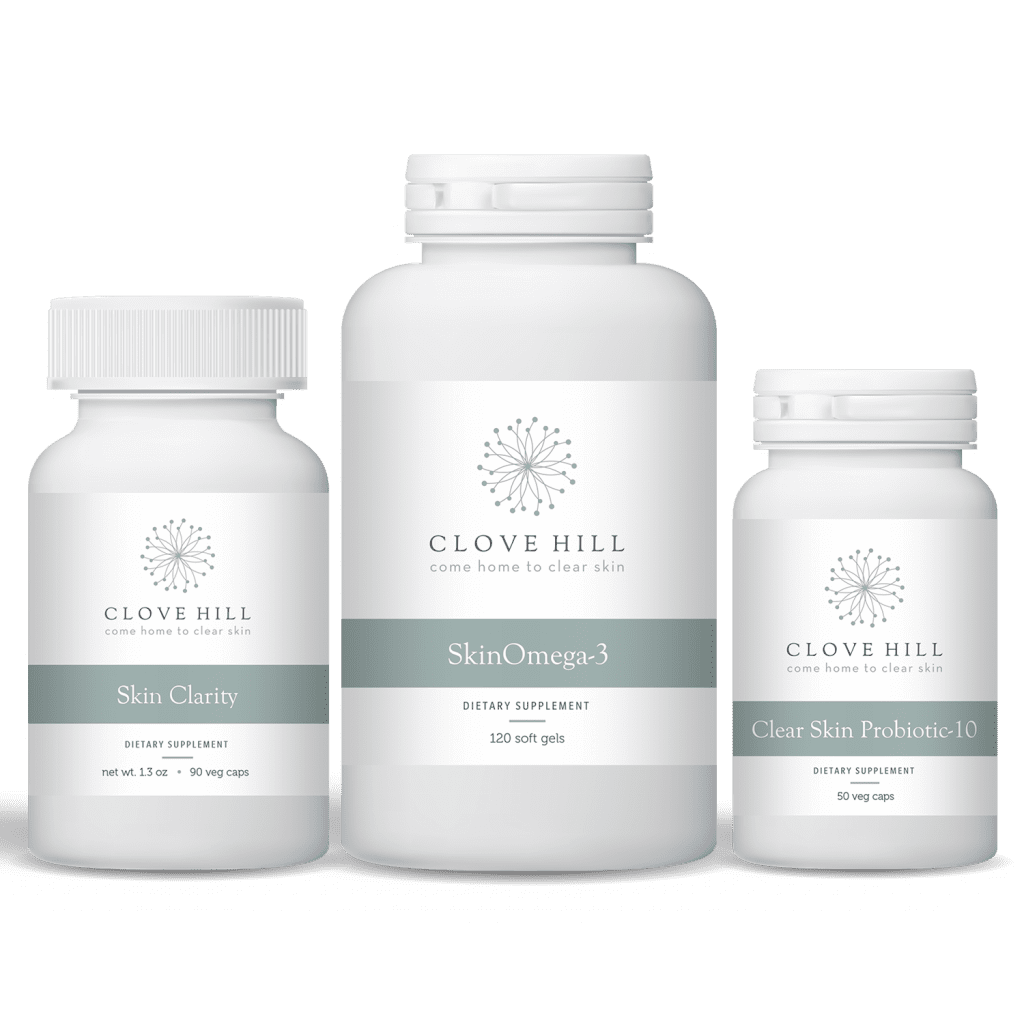
What is it?
Eicosapentaenoic Acid (EPA) is an omega-3 fatty acid found in fish and seafood, particularly oily, ocean fish such as mackerel, sardines, and anchovies. It is arguably the best anti-inflammatory found in nature.
Why is it of value for treating acne?
Inflammation is at the core of acne (externally and systemically), therefore an anti-inflammatory supplement is key to clearing acne. The inflammation process is triggered at the systemic level and then, with many other factors, causes acne at the skin level. An important side note, inflammation is also connected to nearly all chronic diseases such as diabetes, heart disease, arthritis, etc.
Omega-3 fish oil for acne works by inhibiting two inflammatory chemicals that are responsible for acne breakouts, they are called PGE2 and LTB4. One way to inhibit the production of these two chemicals is with the drug Accutane and the other way is, naturally, with EPA omega-3 fatty acids. To find out if you have inflammatory acne click here. EPA Omega-3 supplements and foods are the best way to put out the flame. Research shows that people consuming diets higher in omega-3 fatty acids, such as in Japan, the coastal regions of North Carolina, and Papua New Guinea all have a low rate of acne.
Who should increase their Omega-3 intake?
It is highly recommended that individuals with inflammatory acne on the face and/or body should be eating foods high in omega-3 fatty acids and supplementing with 2 grams (2,000 mg) of EPA omega-3s per day. I have had great success with the Clear Skin Trio (which contains Vitamin A and Omega-3’s) and the Clove Hill Fish Oil. Be sure to check your labels, as you want to have a therapeutic dose of 2,000 mg of EPA per day. This is because EPA is a better anti-inflammatory than DHA. Most Fish Oil supplements will contain more DHA than EPA so be sure to check your labels. If you are pregnant, please consult a physician before starting on fish oil supplements.
In addition to supplements, fish oil for acne such as anchovies, sardines, and mackerel as well as flax seed oil are fantastic resources of omega-3 fatty acids. Omega-3-enriched eggs are also recommended. Soybean, peanut, sunflower, palm oil, and other vegetable oils should be strictly avoided as these will make acne worse by stimulating the PGE2 chemical that causes acne.
Zinc

What is it?
Zinc is a mineral that’s responsible for contributing to many, many functions within the body. To name a few: growth and development, brain function, reproduction, and immune function. In food, zinc is in beans, nuts, seeds, oatmeal, whole grains, lean meats, and oysters.
Why is it of value for treating acne?
Zinc has many important functions for acne clearing. One, zinc assists with the metabolism of omega-3 fatty acids. Two, zinc is an important antioxidant and anti-inflammatory for the skin. Three, zinc helps break down substance P, the nerve chemical that causes sebum production when the body is stressed. Four, zinc is responsible for transporting Vitamin A. An antiacne nutrient, from the liver. Recent studies have shown that people with acne have low levels of zinc in their system.
Who should increase their Zinc intake?
As you can see, Zinc is an important supplement to take with Vitamin A and Omega-3 Fish Oils. Zinc for acne is highly recommended if taking either of these supplements to assist in the uptake and metabolism. It is also recommended as part of a basic supplement regimen for non-inflammatory and inflammatory acne. Approximately 40 mg per day is the therapeutic dose of zinc. Check all your supplement labels as zinc is often added to a multivitamin and the Clove Hill Skin Clarity.
Selenium
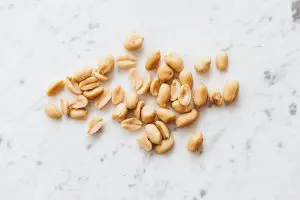
What is it?
Selenium is a minor mineral as well as an antioxidant that works to protect other antioxidants. It can be found in grains, nuts, seafood salmon, and halibut.
Why is it of value for treating acne?
Selenium has been proven to work synergistically with as well as preserve the levels of other antioxidants, such as zinc. Selenium functions in glutathione peroxidase, an enzyme which is very important in preventing the inflammation of acne. This selenium-dependent enzyme that controls glutathione is low in acne patients, and low levels of blood selenium have also been documented. Small amounts of selenium and vitamin e have been shown to improve acne, particularly in those with low baseline glutathione enzyme activity. In addition, research has shown that a deficiency in selenium may play a role in inflammatory conditions such as acne, eczema, and psoriasis.
Who should increase their Selenium intake?
Selenium should be taken along with other antioxidants as well as zinc supplements. The Vitamedica Healthy Skin contains 48 mcg of Selenium per dose.
Ready to clear your acne once and for all? We can help.
From our experience treating thousands of clients, acne usually appears to be triggered by a combination of issues, rather than one. That’s why a typical one-size-fits-all approach rarely works when it comes to clearing and controlling acne over the long run.
If you have tried it all and still have acne, our comprehensive 16-week Online Acne Program is the answer. Our Online Acne Program has a 95% success rate helping thousands of clients get clear. We can help you too!
Get started on your journey to clear by booking an Online Acne Consult today.
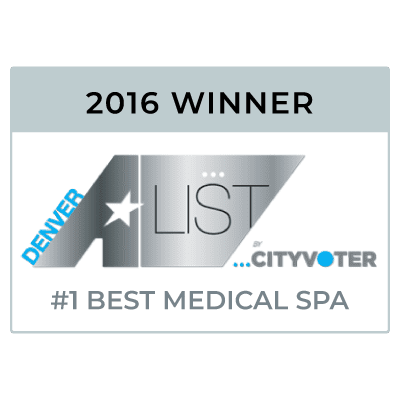
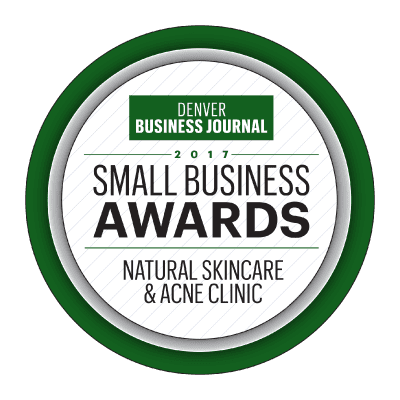
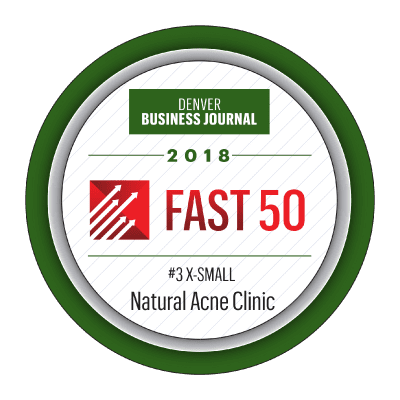
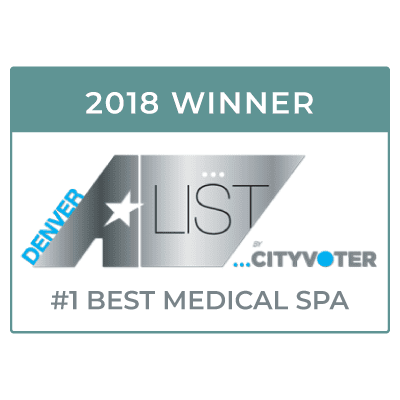
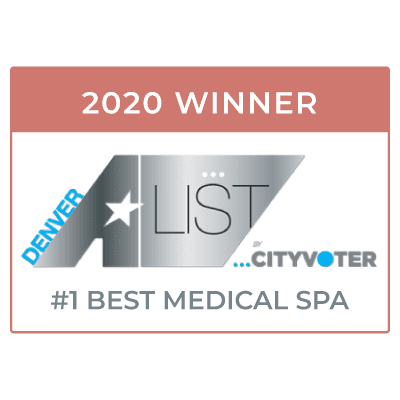

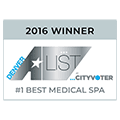
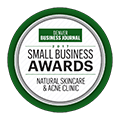
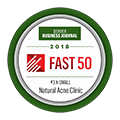
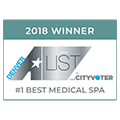
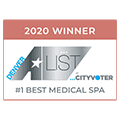

How can I treat my acne marks
Hello Alma,
Red acne marks can be treated with topical lightening of brightening creams and also with Isolaz Photofacial. If you marks are dented in then you would want to do laser treatments of microneedling.
Jessica
Hi Gloria, the Healthy Skin and the Flax Seed capsules are best for inflamed acne.
Hi there! I have extremely oily skin! I have been breaking out on the sides of my cheeks a lot and a little bumps along my jaw line. I have recently cut out milk so I hope that helps a bit but I do drink 8 glasses of water on a daily basis! Will taking omega 3, zinc, vitamin A supplements help? What would you recommend please help!
Dear Veronica,
Yes all of those will help and it is also important to make sure all the skin care you are using is non-pore clogging. If you currently have moderate to severe active acne, in my experience, it takes a program where we change what you are using every few weeks in order to get you clear. You can read more about this under How We Are Successful.
Best Wishes to you!
hello I am seeing a skin doctor so yes try to cut diary out switch to almong milk and get cage free eggs and also stay away from iodized salt switch to sea salt
Hi,
I am currently take 6 capsules of fermented cod liver fish oil daily and today I added zinc and vitamin E to my diet. I would say I have bad acne (I think we tend to judge our own faces more than others do), but I would say I have mild acne. I do have a problem with the PHI phase of acne. Because of my pale skin I do suffer from purpleish pimples that are healing, but still are that nasty color, making me self conscious. Do you think my diet change (adding the zinc and vit E) will help these heal quicker? Any other suggestions?
Note: I have only been taking the cod liver fish oil for ~12 days.
Thanks and happy holidays.
-M.
Hello M,
Thank you for your message! While Cod Liver is high in Vitamin A (which is great for acne), I do not recommend it in this form because is high in iodine, which is one of the main triggers of acne. I have had great success with Vitamedica’s Healthy Skin which is very high in vitamin a and also contains zinc and selenium. While all these vitamins are helpful you also have to treat the skin topically with a non-pore clogging skincare regimen. This is what we provide coaching on, should you need any guidance.
Jessica
hi! my face is currently breakout due to my previous skin routine which consist of mercury. i got so many tiny bumps on my forehead and later on they all turn into acne. now i hv hideous forehead with so many acne and scars. can you please suggest what can be done 🙁
Hi Kayla,
It sounds like you primarily have non-inflamed acne which requires lots of exfoliation. Try a non-pore clogging scrub, AHA serum, Vitamin A serum and chemical peels from an esthetician in your area. If you need more help please contact me!
Jessi
I have different kinds of acne on my skin. There are sometimes tiny tiny pimples all over my forehead,one two big red pimples here and there,a lot of black heads on my nose and whitish heads in chin area. My skin is a combination one. Dry in cheeks and broad oily T-zone. I have pimples since last 5 yrs. I am 20+ yrs now and have a weak liver and some periodic problems. I am in so much problem regarding these since long and I have given up hope. Please try to help me. I would more than appreciate you help. Thanks and regards,Ella
Dear Ella,
Thank you for reaching out. I am here to help you with your skin. It is very normal to have blackheads, acne and dry skin all at the same time. And the liver is very much connected with the skin. Please private message me through the Long Distance Consultation page if you would like more help via our Clear Skin Program and coaching.
Sincerely,
Jessi
i just want to know :
1. does constipation increases acne ?
2. how can i treat the red marks naturally ?
3. vitamin a , zinc and selenium helps it but in which foods can i find them ? cuz i’m a vegetarian and i’m taking an ayurvedic treatment where i cant take carrot spinach nuts nd many more thiNgs so in which foods can i find them ?
4. how do i balance my hormones ?
and lastly i’m a female of 15 yrs and i’m from India so i can neither call nor buy your products so its my humble request and actually i beg u to plz tell me here only plzzzz maam 🙂
Hello Sanjana,
Thank you for your message here. Yes constipation is a problem because your body is backing up bacteria into the blood and the blood is what nourishes our skin. Healthy bowels lead to healthy skin! You can find more information on Vitamin A here: http://naturalacneclinic.com/vitamin-a-for-acne/
I would need to know more about you and your hormones specifically in order to give you any information on hormone balancing. This is part of what we address during a 60-Minute Virtual Holistic Acne Consultation.
Best Wishes,
Jessi
I do not have much inflammation, but I do have moderate acne and I got a lot of blackheads. my skin can also be very oily at times , Which vitamins would you recommend for me
Hello Lourdes,
Thank you for your comment! Because the root cause of acne is too many dead skin cells turning over and clogging the skin, it is important for anyone with acne to be supplementing with Vitamin A….so, I would recommend the Vitamedica Healthy Skin for you. Also sounds like a facial would be helpful to extract the small bumps and blackheads.
Best Wishes,
Jessi
Hello,
My son is 14 yrs old…he has acne ,,he is presently on anitbiotics, can he take vitamins while he’s taking antibiotics?? He is going on his fourth month and frankly I don’t see any changes (minocycline 50mg)…what do you suggest?
thanks!
Hi Nadia,
Thank you for your comment here, yes it is crucial that he be taking Probiotics while on an antibiotic and he also could be taking the Healthy Skin which is an all-natural Accuatane (non-toxic and non-pharmaceutical). Personally, I do not believe that one needs antibiotics or Accutane to get clear….I have gotten hundreds of clients clear without either one. The antibiotics, when they do work, typically just suppress the acne and cause it come back worse once one is off the medication.
Best,
Jessi
Hello Jessica, I would like to know what do you recommend for cystic inflamed acne in the chin area. I get this type of acne usually after 1-2 weeks after my period. So I am guessing when I’m ovulating. I have oily skin but my acne is mainly in the chin area.
Thanks,
Melisa
Hi Melisa,
Thank you for your message, I would recommend the Virtual Holistic Acne Program to get you clear. We would get your hormones back in balance, remove any acne triggering foods and get you on the Face Reality skincare regimen which is fantastic! This is what got me clear at the age of 31 and after I battled acne since 14 years old. Feel free to call me if you want to talk more about your skin.
I am here to help,
Jessi
I had my son 2 weeks ago and broke out with terrible cystic acne. It is very painful. How would you recommend treating this naturally? I am on fenacea right now for the past week. I have yet to see much improvement. This is really affecting my self esteem.
Thank you
Hi Dana,
Congratulations on the birth of your baby boy! I am very sorry to hear about your skin breaking out. Given that there is probably a hormonal component I would recommend doing a homecare regimen such as the Face Reality to manage and clear what is happening on the surface of the skin. The Face Reality products are non-pore clogging and it is a 3-4 month program where we change how you use your products every 2 weeks because the skin will adapt to any regimen you do within that timeframe. By taking this approach, I have a 90% success rate with my program.
If you want more one-on-one help please contact me directly by phone.
Best,
Jessi
Hi Jessi,
I am considering purchasing your Healthy Skin Supplement for my 13 year old son. Would he take 1 or 2 supplements? these Vit A dosages are in no way close to too high a dose for a teen….correct? Thanks so much! I was so happy to find your site, Stacey
Hi Stacey, thank you for this question. We recommend 3 as a therapeutic dose if one has active acne. This along with our 16-week acne clearing program will certainly get him clear:)
Hi. Is it ok if I take vitamin A together with zinc to treat my acne? Or should I just take one kind of vitamin?
Hi Nadia, we recommend Vitamin A, Zinc and Selenium which is all in the Healthy Skin formula available in our store. The three are a powerful trio for acne!
Thank you so much for the reply! In that case, I can take 3 supplement together in one time right?
Hi Jessica,
I have very mild hormonal acne on my chin. It started after my son was born 4 years ago (Im 34). I was looking at the Healthy Skin Formula and wondering if I can combine this with Vitex and L–lysine and Green Tea extract? To help balance the hormones…
Hi Melissa, yes it is very common for women to breakout after having children due to hormonal changes. The Healthy Skin supplement will certainly be of benefit by normalizing your skin and decreasing inflammation, and Vitex will work to rebalance your estrogen and progesterone. L-lysine and green tea extract can be very effective as well, and I see no reason why you cannot combine all of these supplements for optimal health!
Hi! I have been taking biotin to help my hair grown and also to get it back to normal health. But every time I start to take biotin, my face (which is already very oily) get super oily and starts to breakout more often. I already have sensitive skin (even my arms chest, shoulders, and back break out easy) and this seems to make it worse. Would taking vitamin a and since help? And can I also combine adderall XR, biotin, vitamin a, and zinc?
Hi Cameryn, biotin is a known acne trigger as it causes your skin to overproduce cells, which then build up and cause breakouts. Amphetamines can trigger acne as well, so you will want to avoid these if not medically necessary, and certainly I would not combine them with biotin if you want to stay clear. Vitamin A and zinc are extremely beneficial for acne-prone skin, however, as Vitamin A normalizes skin cell production, and zinc decreases inflammation. These will not interact negatively with Adderall XR. I hope this helps!
Jessica, I a 33 year old female, it seems my skin has changed recently. I went from having very few to no acne issues at all to having much more breakouts on a regular basis. I had not changed my routine so I am not sure what happened? What would you recommend as far as vitamins and supplements to take to help combat this issues? Thank you so much.
-Victoria
Hi Victoria. thank you for reaching out to us. I think you would be a great candidate for our Virtual Acne Clearing Program! As adult women, we continue to go through hormonal changes and imbalances throughout our lives, and these changes can often be at the root of a new and seemingly unprovoked acne breakout. Without knowing more about your situation, I can’t recommend specific supplements, but please check out our website at https://www.naturalacneclinic.com/ and set up a consultation if you would like a detailed analysis of your skin and any possible hormonal, dietary, stress-related, or digestive factors that might be triggering your acne.
Hi my skin is prone to small acne and there is redness on cheeks like spots. I have used every household remedy but it didn’t work. Help me
Hi Anjali, I recommend you try the Natural Acne Clinic online clearing program. We specialize in getting clients clear when nothing else has worked, by using innovative skincare products and herbal supplements to balance the body and skin, inside and out. We would love to help you!
Hi, I am taking biotin pills to help stimulate hair growth. I’ve taken these before and it broke me out. Would taking any of the suggested supplements or foods help combat that and cancel out the acne effects that come from biotin?
Hi Jenetra, biotin is going to continue to cause breakouts as long as you are taking it, so I would recommend desisting. Vitamin A, as in our Healthy Skin Supplement, has the opposite effect and actually slows down excessive skin cell production and helps to slough off dead skin. This is the nutrient we need when we are acne prone, as opposed to biotin.
Hello Jessica..
I’m a 54 year old woman with severe nodulcystic acne. I’ve had the acne since I was 24 and have been on every treatment out there. Accutane, spirnolactone, Prednisone, dexamethasone, and just a couple weeks ago started Finasteride. My dermatologist finally referred me to an endocrinologist who ordered blood tests. Not surprisingly, I had extremely high levels of the Androgen hormones DHEA and Testosterone. I am hoping the Finasteride will help, but I have no idea how long it will take to kick in.
Without a doubt, My cystic acne flares up when I am stressed. Unfortunately my life the last couple of years has been turbulent and very stressful. Reducing stress of course would help, but that’s easier said than done!
So I’m researching any alternative methods to minimizing my acne. I don’t need a complete cure….just less severe. I’ve spent thousands of dollars on lasers and fillers for my acne scars. All depressed and rolling scars that are very hard to eliminate.
Any suggestions at this point would help. Have you ever come across anyone my age with this problem?
Thank you!
Debi
Hi, I’ve had breakouts for years now. It is mild, but every little breakout leaves a dark mark for months. I have lots of blackheads on my nose, cheeks, and chin. It was better when I took birth control pills, but since I have stopped taking them, I started breaking out again. I eat healthy and drink lots of water. Used different acne products that have helped at first, but after few months they seem to loose the effect.
Hi Rusiko, thanks for your comment. Natural Acne Clinic’s online clearing program specializes in getting our clients clear when nothing else has worked. Often products work for a little while, as in your experience, but begin to lose their effectiveness after a few weeks. This is because the skin adapts to a product regimen like your muscles adapt to a gym routine, and it is necessary to implement systematic routine changes in order to effectively treat acne. What makes our program so unique is that we change your skincare regimen biweekly over the course of 16 weeks, at the end of which our clients graduate with a clear complexion. We’d love to help you get clear too!
I live in UK, how can I Buy these supplements: healthy skin formula and super EPA DHA fish oil?
Hi Junda,
You should have the option to ship to the UK when you checkout. Let us know if you have problems with this!
-Jessica
I Jessica,
I have been on birth control for a while now, and I want to get off but I fear that that my acne will come back. What can i take before getting off birth control to decrease my chances of getting bad acne?
Hi Jessica
i suffer from mild acne but red inflammation really suffer me, i managed to control my face by benzoyl peroxide 5% and this stuff do the job really good. but i have the courage to control it from inside of my body and stop topical treatment.
i would like to know can these supplements you mentioned with a non abrasive cleanser heal my face on it’s own?
Best wishes
Mehdi
Hi Mahdi, while these supplements will certainly work to re-balance your body, normalize you skin and bring down inflammation, we think that it is important to have a topical skincare routine as well as an internal one. Benzoyl Peroxide 5% is a great ingredient for treating acne, and the supplements mentioned will also be necessary to effectively clear acne from the inside out.
Hi Jessica
I am a 48 year old male and and have been following your regime since January and skin has been as good as its ever been.I have had skin issues all my life.However in the last two weeks my bad old skin has returned particularly in the areas I shave on my face.Red patches,little bumps like hives,very greasy.Any ideas what could have set this off.I have not done anything different..Thanks
Hi Dave, we are so happy to hear that you had success with the program! Regarding the new skin irritation you mentioned, have you tried the Face Reality Ultra Gentle Cleanser, used as a shave cream? I suspect that some product you are shaving with may be clogging your pores and causing the bumps you’ve been noticing. A non-pore clogging product like the one I mentioned and a very clean razor will help with this.
Hello! i am Laura and well have had acne since i was 18 and now i am 33 , i have been treated with antibiotics, accutane, spinorolactone aczone, and a bunch of more products that always causes some other problems!.
Right now i am not taking any medicine and well i have bad breakouts again.
I am taking hydrolyzed collagen and centrum (vitamins), also had to take b complex because i am having some problems on muscles bones and articulations :O. So probably the collagen and B complex can be triggering my acne ?
Hi Laura, yes the B Complex (but not the collagen) is definitely triggering your acne, although if your doctor has recommended that you take this, we wouldn’t want to interfere with that. Vitamins B-12 and B-7 are known acne triggers. Specifically, B-7 (Biotin) increases cellular turnover, which is not what we want when we are acne prone as we are already over-producing skin cells. This increased skin cell production results in congestion and breakouts. Multivitamins also often contain added iodine, which triggers inflammation, irritation, and acne breakouts, as the excess iodine is excreted on the surface of the skin. So that’s something to keep in mind as well. Thanks for your question!
Hi Laura, the collagen should be fine for you, but the Centrum Multivitamin and the B Complex are definitely going to trigger acne, as they contain biotin. Biotin increases skin cell production, resulting in build up and inflammation in the pores.
Hi! I’m struggling with my acne, especially the cystic ones under the skin. What do you recommend is the best?
Hi!
I have combination skin which is usually quite clear these days, although I used to take antibiotics for acne. However recently my acne has flared up once again and I fell like it is due to the fact that I have been on many courses of antibiotics and steroids for tonsillitis and I am enduring the post glandular fever slump as well as possibly a hormonal imbalance. I always have multiple bumps on my face and back although I cleanse, tone and moisturize with products that my GP has recommended. I want to tackle the problem through a more natural means, will vitamin A and zinc be of any good to me?
Hi Andy, thank you for your question. The steroids in particular are certainly triggering your acne, and I would recommend coming off of these as soon as you safely can. Antibiotics will damage your intestinal flora, and the resulting digestive imbalance can exacerbate acne in the long-term as well. That said, Vitamin A and Zinc will definitely be of benefit to you, as Vitamin A will help to normalize your skin cell production, and Zinc will diminish inflammation.
Hi!
I am 20 years old and have had bad acne since I was 13. I have never tried taking vitamins to help clear my acne. I’ve tried many over the counter face washes and even some dermatologist prescribed washes but nothing has worked. My face is very sensitive and dries up very easily. I have many blackheads on my nose. I also have many whiteheads and papules all over my chin, forehead and cheeks. Unfortunately I can’t help but to pick at my face sometimes which has left me with some light scarring. What would you recommend? Also can you take all those vitamins listed at the same time ever day?
Hi Fawn, thanks for reaching out to us. I think you would be a great candidate for our Virtual Acne Clearing Program. We specialize in getting people clear that have tried everything else! Here is a link if you are interested in learning more: https://www.naturalacneclinic.com/online-acne-program/. In answer to your question, yes, you can take the vitamins listed at the same time each day, which is especially helpful if you have trouble remembering to take supplements:) A good start for you would be our Healthy Skin supplement, which combines Vitamin A, Zinc, and Selenium, to normalize skin cell production and decrease inflammation.
Okay so I’m 16 and I have the worst acne in my entire sophomore class I’m a girl so it’s the most unattractive thing ever I feel like and everyone notices it…I’ve tried everything from proactive,clean and clear, panoxyl, etc. and now I’m looking into supplements because there is nothing more embarrassing than acne. Any advice would be helpful!
Hi Sabrina, thank you for reaching out. We understand how frustrating it is and look forward to speaking with you to help you get clear 🙂 The best next step would be to hop online to schedule a 15 minute complimentary consult, or you can schedule a 360-Complexion Analysis so we could thoroughly discuss your situation and provide in depth information about our natural acne program. Here is the link to schedule: https://www.naturalacneclinic.com/online-booking/ Thank you!
Hi my son is 21 and hadcachd on his back can anything help please!
Suzanne.
Hi Suzanne, thank you for your comment! Yes we would be happy to speak with you and provide you with information about our customized 16-week natural acne solutions online program.
The next best step would be to schedule either a 15 minute complimentary consult, or if ready to go deeper, a 1 hour consultation so that we can gather a thorough intake and discuss in depth our program. Here is the link to schedule online: https://www.naturalacneclinic.com/online-booking/
We look forward to speaking with you soon!
Hi, im 43 and just started to get bad acne recently. I have suffered since 14, but did take accutane, once when I was 14 and the 2nd time when I was in my mid twenties. I aslo been on birth control for three years, which all did work for me, but find that the acne eventually would come back. I am currently taking B complex, zinc picolinate, L-Lysine, and antibiotic Doryx MPC 120MG. Since reading the previous comments, I suspect I could be breaking out severely with the B complex vitamins. I stopped taking them today, how long should I see results for my face to clear up? My skin is very oily and the type of acne seems cystic, the kind that hurts. Please advise, thanks C.C.
Hi Carla, Thank you for your comment. I would be happy to speak with you about our 16 week online Natural Acne Program, as we work with individuals world wide.
The best next step would be to hop online to schedule a 15 minute complimentary consult to provide you with information about our program, answer your questions regarding supplement intake, and make sure it is the right fit for you. Here is the link to schedule: https://www.naturalacneclinic.com/online-booking/
I look forward to hearing from you soon and supporting you in getting your skin clear!
hi , i am myraly. Actually i started to breakout when i was 16 years old caused by skincare consists of Mercury. When i stopped using it , my pimples started getting worst day by day… So now i’m basically having acne and acne scars.. Now I start to eat vegan diet and take vitamin c supplement. My question is what kind of acne that im having and what should i do to heal it? Do i have to take multivitamin or probiotics ?
Hi Myraly- Thank you for reading our blog and commenting! We would be happy to speak with you, I suggest you hop online and book a 15 minute complimentary consult. This way we could get a better idea of what you are experiencing and if our program is right for you 🙂 Yes, we do recommend specific vitamins, minerals, and probiotics, etc that are specific for acne prone skin…congrats on making healthy dietary changes! Here is the link to schedule: https://www.naturalacneclinic.com/online-booking/ We look forward to speaking with you.
Hi, i am just 20 and since last 3 months i have acne on my cheecks and jawline now a days my dermatlogist gave me isotretinoin but my acne is getting worse like red cysts. I am not taking any dairy product now suggest me ehat should i do.
Hi Ramsha, thank you reaching out! Figuring out what to do can be frustrating and overwhelming. We would be happy to speak with you about our 16 week customized natural acne program. The next best step would be to schedule either a 15 minute complimentary consult, or if ready to go deeper, a 1 hour consultation so that we can gather a thorough intake and discuss in depth our program. Here is the link to schedule online: https://www.naturalacneclinic.com/online-booking/
We look forward to speaking with you soon!
I got rid of my acne by changing my diet and adding supplements. I found that some foods feed acne while others kill it. I wrote about it here https://healacnenaturally.wordpress.com/2018/01/20/how-to-get-rid-of-your-acne-for-good/
Congrats on clearing your acne and thank you for sharing your blog post!
Hi! My daughter is 19 and is having trouble with acne across her forehead. It is mostly on the forehead between her eyes and sometimes along the hair line. She had tried using apply cider vinegar but has not had any success. Which vitamin combination would you suggest and how much of each?
Hi Misty- Thank you for your comment and we understand how frustrating dealing with acne can be especially for your daughter who is 19 years old. In order to provide the correct information for your daughter regarding supplements, the best next step would be to hop online to schedule either a 15 minute complementary consult or if ready to go deeper, a 1 hour consultation so that we can gather a thorough intake and discuss in depth our customized natural acne program which includes diet, supplements, lifestyle, skincare, etc. Here is the link to schedule online: https://www.naturalacneclinic.com/online-booking/
We look forward to hearing from you!
Hi…I got some black spots not lot of redness not pimples it’s feels me so ugly I hate this
Hi Khan- Thank you for reading our blog post and we hope you have found it informative. We would be happy to speak with you to help you sort out what is currently going on with your skin. The best next step is to hop online to schedule either a 15 minute complementary consult or if ready to go deeper, a 1 hour consultation so that we can gather a thorough intake and discuss in depth our natural acne program. Here is the link to schedule online: https://www.naturalacneclinic.com/online-booking/
We look forward to hearing from you!
Hi Jessica, can you please recommend a good, non-acne triggering multivitamin? I’ve been reading your blog, which is extremely informative, and see that biotin and other vitamin Bs trigger acne. Can you recommmend one or two multivitamins without these? Thank you!
I forgot to mention, I just purchased the VitaMedica trio and want to be sure I have all the right supplements covered. I hope they help! I tend to have cystic acne on my chin and jawline. I also began taking Vitex recently and take oral collagen supplements.
Hi Amy, we are so happy to hear you are enjoying reading our blog and that it has been very informative for you! Stay tuned for more products available for purchase through our site! We do have an acne safe Multivitamin as well as one called Healthy Skin. Both specifically formulated for acne prone skin with the highest quality organic ingredients 🙂 Sounds like you are off to a good start with the supplements purchased, and we would be happy to set up a time to speak with you so that we can continue to support you moving forward towards your goal of clear skin with a customized plan. Here is the link to schedule: https://www.naturalacneclinic.com/online-booking/
Thanks again and we look forward to hearing from you soon!
I have acne problem, face, chest and back. Please which vitamin can I take please?
Hi Junie, Thank you for your comment, and we would be happy to help you! The next best step would be to schedule either a 15 minute complimentary consult, or if ready to go deeper, a 1 hour consultation so that we can gather a thorough intake and discuss in depth our program. This way we can also ensure we are recommending the supplements that fits your specific needs. Here is the link to schedule online: https://www.naturalacneclinic.com/online-booking/. In the meantime you can look over the VitaMedica Healthy Skin Formula on our site.
Hi! I am up late looking for different way to get rid of my acne, I came across your page… I started breaking out about a month ago, It started out with little bumps all over my forehead and I thought I reacted to the hair extension I had since my face started breaking out then. I immediately took the extensions and hoped it will go away. Unfortunately, It didn’t get better but it didn’t get worse neither. I thought may be I need to detox so I did that, and started eating super healthy. I felt good physically but my face was still the same. I couldn’t figure out until few days ago when I got sick of looking at my acne and decided to put make on (Fenty Beauty), it’s a fairly new product and It hid my acne well but by the end of the day my face was really irritated and I had double the amount of acne on my forehead. I then searched if others had the same experience with this make up and found out other people also had acne after using this product.It also contains dimethicone and silicone. The last time I experienced acne was about 10 years ago. I went to a dermatologist but it didn’t help. I just started retin a two days ago. I am just wondering if I should get the three vitamins or do you recommend something else?
Hi Redi- Thank you for your comment, and it sounds like you have tried quite a few things to navigate a solution. We would be happy to speak with you about our 16 week online Natural Acne Program, as we work with individuals world wide.
The best next step would be to hop online to schedule a 15 minute complimentary consult to provide you with information about our program, and address your question regarding supplements. Here is the link to schedule:
https://www.naturalacneclinic.com/online-booking/.
We look forward to speaking with you soon!
Hello, I have acne on my neck, right around my jaw line and it sometimes turns to the cystic acne. I’m at a loss for what I can do. I’ve been using proactive but it’s dries my akin out. What can I do to help?
Hi Nikkole, Thank you very much for visiting our blog as well as leaving a comment. We understand how challenging it is to navigate your way to clear skin on your own and would be happy to be of support. We offer a Online 16 week Natural Acne Program that balances the body internally using specific herbs/supplements, dietary and lifestyle changes while also supporting the skin externally with a customized topical skincare regimen. The best next step would be to hop online to schedule a 15 minute complimentary consult to provide you with information about our program and make sure it is the right fit for you. Here is the link to schedule: https://www.naturalacneclinic.com/online-booking/.
Hi,
I love this blog! I have started taking Probiotics daily. It started to help but I still have regular breakouts. I have never tried Vitamin A, Zinc or Omega 3. I would like to try these together in combination. My question is, how much should I take of these three daily? I have read to be careful with taking Vitamin A and I want to be sure not to take too much.
Thank you so much for your skincare advice!
Hi Kelsey- Thank you very much for your comment and we are so glad to hear you love our blog!! Yes, regarding Vitamin A you do not want to exceed 10,000 IU per day and it is best to get it in the precursor form, Beta-Carotene which is what we use in our Healthy Skin supplement….it also contains Zinc, Selenium and liver supportive herbs. You can check it out in our online store to read more about it. We also have a very high quality Fish Oil in our online store that you can look into as well. The combination of Fish Oil and Healthy Skin sounds like it would be a good start for you. We do offer a 15 minute Complimentary Consult if you would like to learn more about our Online 16-Week Natural Acne Program and see if it is a good fit. Here is the link to schedule: https://www.naturalacneclinic.com/online-booking/ Thanks again! 🙂